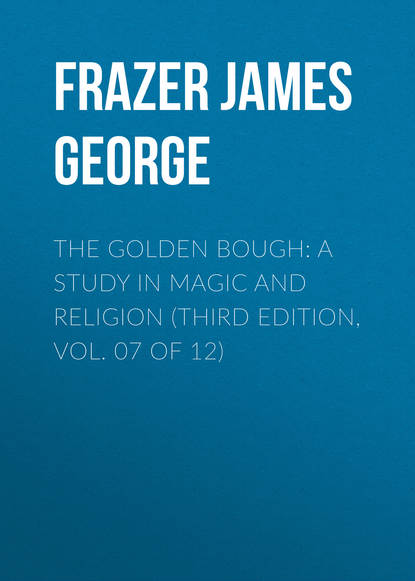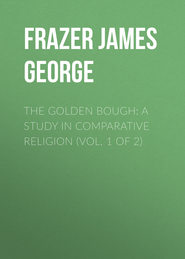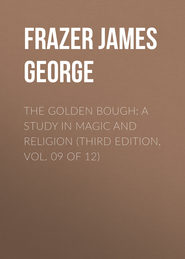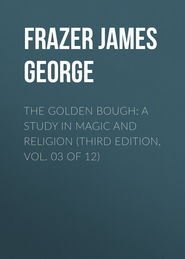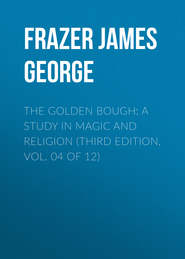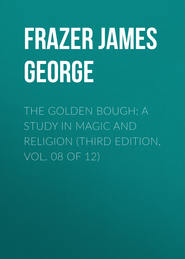По всем вопросам обращайтесь на: info@litportal.ru
(©) 2003-2024.
✖
The Golden Bough: A Study in Magic and Religion (Third Edition, Vol. 07 of 12)
Настройки чтения
Размер шрифта
Высота строк
Поля
Dittenberger, Sylloge Inscriptionum Graecarum,
No. 628.
181
The view that the Festival before Ploughing (Proerosia) fell in Pyanepsion is accepted by W. Mannhardt and W. Dittenberger. See W. Mannhardt, Antike Wald- und Feldkulte (Berlin, 1877), pp. 238 sq.; id., Mythologische Forschungen, p. 258; Dittenberger, Sylloge Inscriptionum Graecarum,
note 2 on Inscr. No. 628 (vol. ii. pp. 423 sq.). The view that the Festival before Ploughing fell in Boedromion is maintained by August Mommsen. See his Heortologie (Leipsic, 1864), pp. 218 sqq.; id., Feste der Stadt Athen im Altertum (Leipsic, 1898), pp. 192 sqq.
182
See below, p. 82 (#x_10_i13).
183
L. Ideler, Handbuch der mathematischen und technischen Chronologie (Berlin, 1825-1826), i. 292 sq.; compare August Mommsen, Chronologie (Leipsic, 1883), pp. 58 sq.
184
For example, Theophrastus notes that squills flowered thrice a year, and that each flowering marked the time for one of the three ploughings. See Theophrastus, Historia Plantarum, vii. 13. 6.
185
Hesiod, Works and Days, 383 sqq. The poet indeed refers (vv. 765 sqq.) to days of the month as proper times for engaging in certain tasks; but such references are always simply to days of the lunar month and apply equally to every month; they are never to days as dates in the solar year.
186
See below, p. 72 (#x_10_i1).
187
Dionysius Halicarnasensis, Antiquit. Rom. i. 12. 2.
188
Xenophon, Historia Graeca, vi. 3. 6.
189
Isocrates, Panegyric, 6 sq.
190
Dittenberger, Sylloge Inscriptionum Graecarum,
No. 20 (vol. i. pp. 33 sqq.); E. S. Roberts and E. A. Gardner, An Introduction to Greek Epigraphy, Part ii. (Cambridge, 1905) No. 9, pp. 22 sqq.
191
Aristides, Panathen. and Eleusin., vol. i. pp. 167 sq., 417 ed. G. Dindorf (Leipsic, 1829).
192
Diodorus Siculus, v. 2 and 4; Cicero, In C. Verrem, act. ii. bk. iv. chapters 48 sq. Both writers mention that the whole of Sicily was deemed sacred to Demeter and Persephone, and that corn was said to have grown in the island before it appeared anywhere else. In support of the latter claim Diodorus Siculus (v. 2. 4) asserts that wheat grew wild in many parts of Sicily.
193
Diodorus Siculus, v. 4.
194
This legend, which is mentioned also by Cicero (In C. Verrem, act. ii. bk. iv. ch. 48), was no doubt told to explain the use of torches in the mysteries of Demeter and Persephone. The author of the Homeric Hymn to Demeter tells us (verses 47 sq.) that Demeter searched for her lost daughter for nine days with burning torches in her hands, but he does not say that the torches were kindled at the flames of Etna. In art Demeter and Persephone and their attendants were often represented with torches in their hands. See L. R. Farnell, The Cults of the Greek States, iii. (Oxford, 1907) plates xiii., xv. a, xvi., xvii., xviii., xix., xx., xxi. a, xxv., xxvii. b. Perhaps the legend of the torchlight search for Persephone and the use of the torches in the mysteries may have originated in a custom of carrying fire about the fields as a charm to secure sunshine for the corn. See The Golden Bough,
iii. 313.
195
The words which I have translated “the bringing home of the Maiden” (τῆς Κόρης τὴν καταγωγήν) are explained with great probability by Professor M. P. Nilsson as referring to the bringing of the ripe corn to the barn or the threshing-floor (Griechische Feste, Leipsic, 1906, pp. 356 sq.). This interpretation accords perfectly with a well-attested sense of καταγωγή and its cognate verb κατάγειν, and is preferable to the other possible interpretation “the bringing down,” which would refer to the descent of Persephone into the nether world; for such a descent is hardly appropriate to a harvest festival.
196
Cicero, Pro L. Flacco, 26.
197
Himerius, Orat. ii. 5.
198
Μητρόπολις τῶν καρπῶν, Aristides, Panathen. vol. i. p. 168 ed. G. Dindorf (Leipzig, 1829).
199
Dittenberger, Sylloge Inscriptionum Graecarum,
No. 20, lines 25 sqq.; E. S. Roberts and E. A. Gardner, Introduction to Greek Epigraphy, ii. (Cambridge, 1905) No. 9, lines 25 sqq., κελευέτω δὲ καί ὁ ἱεροφάντης καὶ ὁ δᾳδοῦχος μυστηρίοις ἀπάρχεσθαι τοὺς Ἔλληνας τοῦ καρποῦ κατὰ τὰ πάτρια καὶ τὴν μαντείαν τὴν ἐγ Δελφῶν. By coupling μυστηρίοις with ἀπάρχεσθαι instead of with κελεύετω, Miss J. E. Harrison understands the offering instead of the exhortation to have been made at the mysteries (Prolegomena to the Study of Greek Religion, Second Edition, p. 155, “Let the Hierophant and the Torchbearer command that at the mysteries the Hellenes should offer first-fruits of their crops,” etc.). This interpretation is no doubt grammatically permissible, but the context seems to plead strongly, if not to be absolutely decisive, in favour of the other. It is to be observed that the exhortation was addressed not to the Athenians and their allies (who were compelled to make the offering) but only to the other Greeks, who might make it or not as they pleased; and the amount of such voluntary contributions was probably small compared to that of the compulsory contributions, as to the date of which nothing is said. That the proclamation to the Greeks in general was an exhortation (κελευέτω), not a command, is clearly shewn by the words of the decree a few lines lower down, where commissioners are directed to go to all Greek states exhorting but not commanding them to offer the first-fruits (ἐκείνοις δὲ μὴ ἐπιτάττοντας, κελεύοντας δὲ ἀπάρχεσθαι ἐὰν βούλωνται κατὰ τὰ πάτρια καὶ τὴν μαντείαν ἐγ Δελφῶν). The Athenians could not command free and independent states to make such offerings, still less could they prescribe the exact date when the offerings were to be made. All that they could and did do was, taking advantage of the great assembly of Greeks from all quarters at the mysteries, to invite or exhort, by the mouth of the great priestly functionaries, the foreigners to contribute.
200
August Mommsen, Feste der Stadt Athen im Altertum (Leipsic, 1898), pp. 192 sqq.
201
Eustathius on Homer, Iliad, ix. 534, p. 772; Im. Bekker, Anecdota Graeca, i. 384 sq., s. v. Ἁλῶα. Compare O. Rubensohn, Die Mysterienheiligtümer in Eleusis und Samothrake (Berlin, 1892), p. 116.
202
Eustathius on Homer, Iliad, ix. 534, p. 772; Im. Bekker, Anecdota Graeca, i. 384 sq., s. v. Ἁλῶα.





